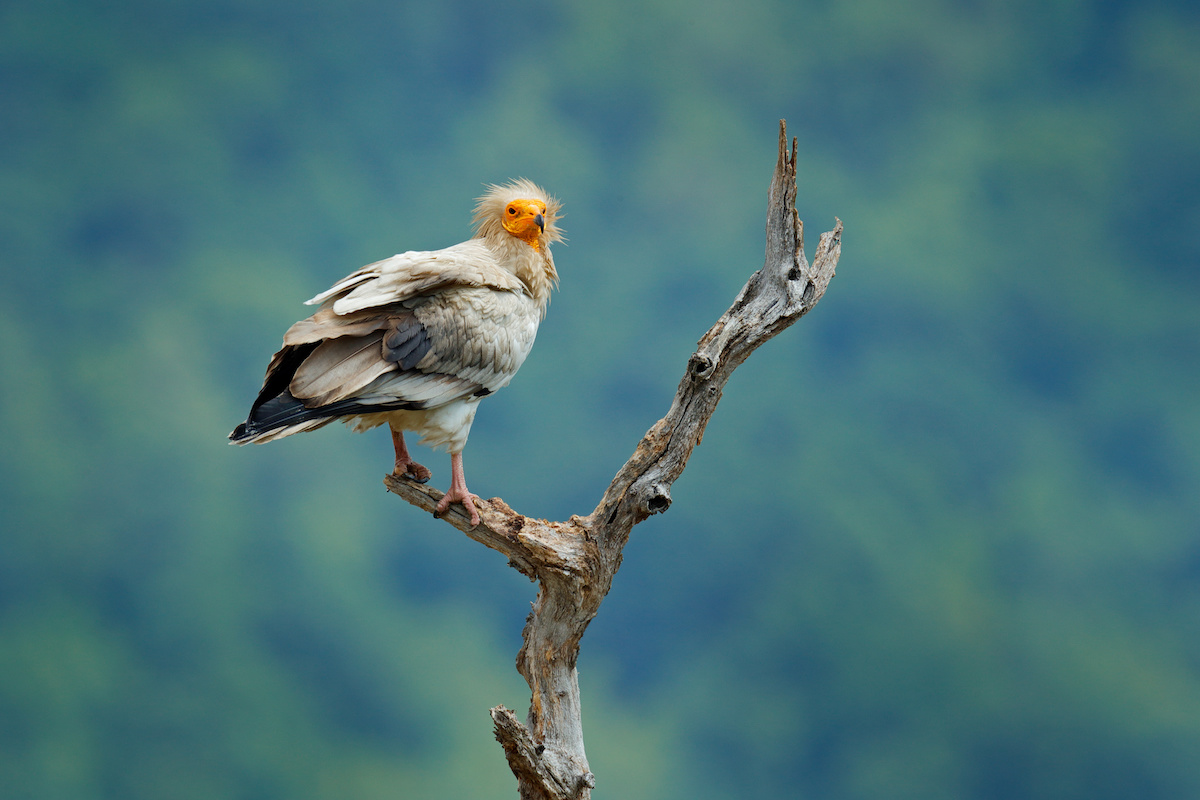
Contribution of the Egyptian Vulture New LIFE project to the Newsletter of the Vulture Specialist Group Issue September 2020

Media campaign was conducted by BirdLife Africa, NCF and SCF in Nigeria and Niger to stop the illegal killing of vultures. Moreover, a series of trainings on plant-based alternatives to vultures was held in Nigeria by NCF. In February 2020, explicit monitoring of SCF revealed seven new breeding territories of Egyptian vultures in Koutous Massif, Niger, increasing the total population size to 11 resident pairs. EWNHS provided equipment and utilities to two primary schools located in the core wintering area of the Egyptian vultures in Ethiopia, as a baseline to start an environmental-educational programme focused on vultures.
# Middle Eastern Round-up:
Report on the results from the Sarimazi Raptor Count 2019 in Turkey, where over 900 Egyptian vultures passed in just one month, was published by DD. Telemetry helped to investigate the threats for the Egyptian vultures in Turkey (electrocution and poisoning), Iraq (direct persecution) and Saudi Arabia (electrocution and poisoning). Additionally, poisoning of feral dogs and other pests (e.g. crows) with Lannate or even Strychnine was identified by NCE and SPNL as a serious potential threat for the Egyptian vulture and other migratory raptors in Lebanon and Egypt. Field survey to evaluate the impact of electrocution with hazardous powerlines was conducted in Egypt and Syria.
Over 150 students and 11 teachers from four schools took part in the awareness programme led by RSCN and dedicated to the conservation of vultures in Jordan. Due to COVID-19, the World Migratory Bird Day (WMBD) in Spring 2020, was celebrated mostly online by spreading widely conservation messages in the social networks about the migratory Egyptian vultures by DD in Turkey, SWA in Saudi Arabia and SSCW in Syria. Information signboards dedicated to the Egyptian vulture were installed by SPNL in five “hima” (traditional reserves), and hundreds of nature-lovers were informed about the status and threats for migratory vultures during the Raptor Count 2019 in Lebanon.
# Balkan (eastern-European) Round-up:
Monitoring of the Egyptian vulture breeding territories in 2020 in the Balkans revealed a small increase in occupied territories in Eastern Rhodopes and North-east Bulgaria, however, the overall decrease of the Balkan population continues, albeit at a smaller rate. Ringing in Bulgaria helped to identify a 12-years old wild bird. SmartBirds – free application for mobile phones was launched in Albania to monitor the levels of threats for vultures and other biodiversity.
The network of supplementary feeding stations in the Balkans is growing. Another vulture restaurant was built by HOS in Western Greece, in addition to the existing feeding site in Meteora. The two supplementary feeding stations in southern Albania managed by PPNEA operated successfully in 2020, and one more vulture restaurant was maintained by MES and the Aquila NGO in Northern Macedonia. For the 8th consecutive year, a volunteer-based nest-guarding programme for the Egyptian vulture was held by BSPB in August 2020 in Bulgaria.
In terms of anti-poison work, the annual report 2019 on the work of the Antipoison Dog Units in Greece was published (in Greek with English summary): in total, 29 dead animals were found poisoned during 26 patrols by HOS in Central Greece and 22 patrols by WWF Greece in Thrace. In February 2020, the local stakeholder antipoison network helped the investigation of a mass poisoning case (13 vultures) in the most important remaining colony of Griffon Vultures in western Greece. Moreover, pilot testing of fladry fencing and foxlights as alternative methods to poisoning to protect livestock from predators started in Greece. In Bulgaria, the Antipoison Road Map successfully went through a public consultation in May 2020 and was formally submitted by BSPB to the Ministry of Environment and Waters in September 2020. Additionally, field studies and explicit analyses on the publicly available information and the legislative status of the veterinary medical products (VMP) and pesticides dangerous for vultures were made in Bulgaria. An emblematic Egyptian vulture pair from the core population that was regularly used to foster captive-bred chicks was poisoned. Analyses of the legislative status of VMPs and pesticides were conducted also in Albania.
Reinforcement programme for the Balkan Egyptian vulture population led by BSPB continued in 2020, by testing delayed release, fostering and hacking in Bulgaria. This conservation experiment is largely supported by the captive breeding programme of EAZA EEP, coordinated by Prague Zoo and with the involvement of Wildlife Rehabilitation and Breeding Centre of Green Balkans and Sofia Zoo.
Ethnographic study on the human perceptions about vultures in nine countries along the flyway of the Egyptian vulture was published by HOS. A video camera installed by BSPB in a wild nest of Egyptian vultures in Bulgaria is life-streaming for the ninth consecutive year. Two more live cameras are broadcasting online – one from the aviary for delayed release and hacking of Egyptian vultures in Eastern Rhodopes, and a second one from the captive breeding facility for Egyptian vultures of the Green Balkans in Stara Zagora. Joint awareness campaign to conserve the Vjosa River and the Egyptian vultures inhabiting its valley started in Albania, implemented by EcoAlbania, AOS and PPNEA. Environmental-education programme dedicated to Egyptian vultures continues in Albania. The WMBD 2020 with focus on the conservation of the Egyptian Vulture was celebrated in North Macedonia. Despite the difficult times, the campaign A Mile for the Egyptian Vulture continues to support this amazing bird: two members of the ASPROPARIS team (created by WWF Greece) placed fifth in the international race “On the Traces of Heroes” in Greece.
